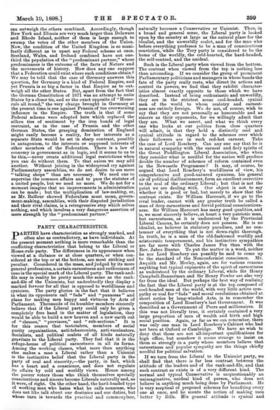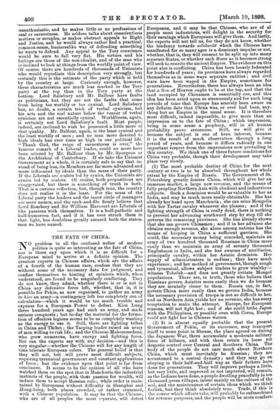PARTY CHARACTERISTICS.
pARTIES have characteristics as strongly marked, and often also as contradictory, as have individuals. At the present moment nothing is more remarkable than the conflicting characteristics that belong to the Liberal or Home-rule party. The differences in its appearance when viewed at a distance or at close quarters, or when con- sidered at the top or at the bottom, are most striking and peculiar. Considered in the mass, and judged by its more general professions, a certain earnestness and enthusiasm of tone is the special mark of the Liberal party. The rank-and- file may in reality be pretty much the same as the rank- and-file of the Unionists, but undoubtedly they display a marked fervour for all that is opposed to worldliness and cynicism. The party glories in the fact that it believes in what its opponents call "fads" and " panaceas " and plans for making men happy and virtuous by Acts of Parliament. Thousands of its humbler members sincerely believe that if the Liberal party could only be given a completely free hand in the matter of legislation, they would be able to build a new heaven and a new earth out of "clauses," "provisoes," and " sub-sections." It is for this reason that teetotalers, members of social purity organisations, anti-tobacconists, anti-vaccinators, Socialists, and political zealots of all kinds naturally gravitate to the Liberal party. They feel that it is the refuge-house of political earnestness in all its forms. Among the working classes, what more than anything else makes a man a Liberal rather than a Unionist is the instinctive belief that the Liberal party is the party of zeal and sincerity,—the party, in fact, which has a heart and a conscience, and does not regulate its affairs by cold and worldly views. Hence among the poorer voters those who think themselves specially conscientious and sincere become Liberals naturally and, as it were, of right. On the other hand, the hard-headed type of working man who hates what he calls nonsense, who does not like talk about our destinies and our duties, but whose turn is towards the practical and commonplace, naturally becomes a Conservative or Unionist. Thus, in a broad and general sense, the Liberal party is looked upon by the country at large as the natural place for the idealist, and the unworldly zealot, and for the man who before everything professes to be a man of conscientious conviction, while the Tory party is considered to be the home of the worldly, the cold-hearted, the hard-headed, the self-centred, and the unideal.
Such is the Liberal party when viewed from the bottom. The contrast when viewed from the top is nothing less than astounding. If we consider the group of prominent Parliamentary politicians and managers in whose hands the fate of the party really rests, who direct its actions and control its powers, we find that they exhibit character- istics almost exactly opposite to those which we have described. Instead of being enthusiastic and unworldly, they are in the strictest sense cool-headed, cynical men of the world to whom zealotry and earnest- ness are entirely foreign. We do not, of course, wish to say that they are not personally as honourable and as sincere as their opponents, for we willingly admit that they are. What we assert, and what we think every one who looks at our politics from close quarters will admit, is that they hold a distinctly cool and cynical attitude in regard to the schemes over which their followers are in such red-hot earnest. Take the case of Lord Rosebery. Can any one say that he is in natural sympathy with the earnest and fiery spirits of the Great Peddlington Liberal Association, who when they consider what is needful for the nation will produce double the number of schemes of reform contained even in the Newcastle Programme ? It may, of course, be argued that Lord Rosebery's worldliness of view, his comprehensive and good-natured cynicism, his general air of political disillusionment, form an excellent corrective to the zeal of the ordinary Liberal ; but that is not the point we are dealing with. Our object is not to say whether it is good or bad, but merely to show that the contrast exists. Sir William Harcourt, if we go to the rival leader, cannot with any greater truth be called a man of deep earnestness and fervid political conscientious- ness. Sir William Harcourt has many good qualities, and is, we most sincerely believe, at heart a very patriotic man, but earnestness, as it is understood by the Provincial Liberal Caucus, he certainly does not possess. He is no idealist, no believer in statutory paradises, and no con- temner of everything that is not down-right thorough. In truth, he is a man of the old-fashioned worldly and aristocratic temperament, and his instinctive sympathies are far more with Charles James Fox than with the Rev. Jabez Bunter. To put the matter in a word, neither he nor Lord Rosebery can possibly be said to come up to the standard of the Nonconformist conscience. Mr. Asquith and Mr. Morley, again, are for various reasons anything but typical exponents of the spirit of earnestness as understood by the ordinary Liberal, while Sir Henry Campbell-Bannerman and Sir Henry Fowler are also very far from the ideal. But perhaps the best way of realising the fact that the Liberal party is at the top composed of cool-headed men of the world, with very little active sym- pathy or zeal for "fads" and moral revolutions obtained at short notice by long-winded Acts, is to remember the composition of Lord Rosebery's last Government. It was described as a Government of Peers and millionaires. If this was not literally true, it certainly contained a very large proportion of men of wealth and birth and high social position. Again, as far as we can remember, there was only one man in Lord Rosebery's Cabinet who had not been at Oxford or Cambridge. We have no wish to deny that these are not all-important qualifications for high office, but somehow it seems strange to insist on them so strongly in a party whose members believe that earnestness and popular sympathy are the things chiefly needful for political salvation.
If we turn from the Liberal to the Unionist party, we shall find that there is far less contrast between the attitude of the leaders and of the rank-and-file, and that such contrast as exists is of a very different kind. The normal and typical Conservative is unquestionably an unimaginative, unideal kind of person, who does not believe in anything much being done by Parliament. He is very sceptical of proposed schemes for benefiting every one at once, and he scouts the notion of making men better by Bills. His general attitude is cynical and unenthusiastic, and he makes little or no professions of zeal or earnestness. He seldom talks about conscientious motives or scruples, or makes abstract appeals to Right and Justice, and he would always rather find a practical, common-sense, businesslike way of defending something he wants to defend. Any appeal to the Tory conscience would be sure to fall very flat. His virtues and his failings are those of the non-idealist, and of the man who is inclined to look at things from the worldly point of view. Of course there are hundreds of thousands of Unionists who would repudiate this description very strongly, but certainly this is the estimate of the party which is held by the country at large. Curiously enough, however, these characteristics are much less marked in the Tory party at the top than in the Tory party at the bottom. Lord Salisbury and Mr. Balfour have faults as politicians, but they are not the faults that come from being too worldly or too cynical. Lord Salisbury has, no doubt, a certain trick of verbal cynicism, but his acts and the real nature below the veneer of verbal cynicism are not essentially cynical. Worldliness, again, is certainly not Lord Salisbury's fault. Most people, indeed, are inclined to wish he possessed a little more of that quality. Mr. Balfour, again, is the least cynical and the least worldly of men ; and no man more devoted to high ideals has ever risen so high in our political life. "Thank God, the reign of earnestness is over," the famous remark of a Liberal leader, could no more have been uttered by Mr. Balfour than by Mr. Spurgeon or the Archbishop of Canterbury. If we take the Unionist Government as a whole, it is certainly safe to say that in- stead of being less, its Members are far more advanced and more influenced by ideals than the mass of their party. If the Liberals are zealots led by cynics, the Unionists are -cynics led by zealots. Of course, both propositions are exaggerated, but there is something of truth in both. That is a curious reflection, but, though true, the country does not realise it in the least. For the mass of the Liberal party the leaders and the inner circle of managers are mere names, and the rank-and-file firmly believe that Lord Rosebery and Sir William Harcourt are Liberals of like passions with themselves. It is a half-pathetic and half-humorous fact, and if it has ever struck them in that light, has doubtless greatly amused both the states- men we have named.







































 Previous page
Previous page